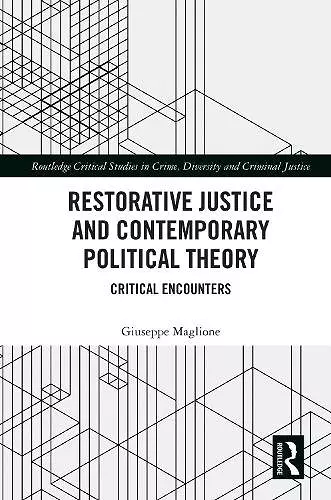Restorative Justice and Contemporary Political Theory
Critical Encounters
Format:Hardback
Publisher:Taylor & Francis Ltd
Published:19th Nov '24
Currently unavailable, and unfortunately no date known when it will be back

Outlining an original analysis of the political dimension of restorative justice, this book seeks both to enhance the critical comprehension of this phenomenon and to forge new tools for acting politically through restorative justice, inviting restorative justice scholars, practitioners and advocates to become a radical political movement.
Restorative justice is widely studied, nationally and internationally legislated, and increasingly practised; however, the growth of relevant policy, practice and research has been only marginally accompanied by the development of updated, theoretically informed and critical reflections on the relationships between politics and restorative justice. This is a significant problem since neglecting the political dimension may limit the capacity of the restorative justice movement to critically appreciate its possible role in confronting oppressive social and political arrangements. This book addresses this gap by providing reflections on restorative justice in relation to six complex political concepts – difference, sovereignty, community, identity, equality and subalternity. Engaging with the thoughts of Gilles Deleuze, Giorgio Agamben, Jean-Luc Nancy, Judith Butler, Jacques Rancière and Gayatri Chakravorty Spivak, each chapter works as a prism to unravel and reconstruct creatively restorative justice unearthing its political conditions and effects.
Providing an innovative contribution to our thinking about the political nature and significance of restorative justice from the specific perspective of political theory, Restorative Justice and Contemporary Political Theory will appeal to both students and scholars of restorative justice specifically and of criminal justice and criminology more broadly.
"A decades-long expansion has unmoored community-based alternatives to state justice from their early theoretical and critical promise. Adopting the mantel of 'restorative justice,' these alternatives tend to fix their operation within a technical ethos that secures success as naturalized solutions to state-defined problems. Maglione's thoughtful analysis clarifies and highlights the importance of retrieving contemporary political, social, and cultural theorizing to provide fluid ways to engage restorative initiatives. Drawing on key theories, this book successfully grinds novel critical lenses that bring into focus complex political arenas by which to engage democratic, unsettled, nomadic, subaltern, and constantly emerging practices of restorative justice.”
--George Pavlich, University of Alberta, Canada
"In a work of cutting edge criticism and sparkling originality, Maglione explores the most prominent political implications for restorative justice in our time. His penetrating encounter with contemporary political thought examines the problems of diversity and democracy, community and identity, sovereignty and oppression. This will become an essential handbook for both the theory and creative practice of restorative justice."
--Phil Carney, University of Kent, U.K.
“For at least a generation, restorative justice has seemed to be a unique answer to the crises of criminal justice. So, there has been huge growth in interest in the study, practice, law and policy development of RJ. Yet, does the reality of this growth live up to the various claims and hopes of RJ? What do we know about the relationship between RJ and political theory? In his superbly creative book, Maglione shepherds us to think, and rethink, the relationships between RJ and fundamental political and social concepts like sovereignty, community, identity, difference, equality and subalternity. In doing so, we are better equipped to read the past, present and future or RJ; and to reimagine its wider potential contribution to addressing social, political and cultural injustices.”
--Cyrus Tata, University of Strathclyde, U.K.
"Even though this is a book I would have loved reading when I started discovering restorative justice, reading it today feels equally important and certainly like a gift. Embedded within both a critical and imaginative strand in restorative justice literature, the book aims at deconstructing and reconstructing restorative justice’s main tenets from different and rich political-philosophical angles and threads, by creating a sustained dialogue with the work of important political philosophers. In line with his previous work, the author remains committed to open up paths within the restorative justice movement by stimulating the development of a critical and radical political imagination around restorative justice. This book is timely and important, because as older generations of scholars leave the restorative justice field, younger generations are searching for innovative, daring and engaging analyses that can widen our intellectual horizons and deepen our political and ethical commitments towards justice".
--Brunilda Pali, University of Amsterdam, The Netherlands
"Restorative Justice and Contemporary Political Theory is a provocative book in the best sense of the word. In it, Maglione provokes us to reconsider our assumptions about harm and justice through our encounter with six important theorists. His skilled conceptual excavation allows us to ask more of restorative justice, so that we might push it toward becoming more than an ossified and institutionalised justice mechanism".
--Andrew Woolford, University of Manitoba, Canada
“Restorative justice came out of the shadows to inspire a worldwide movement of social justice. While we are still learning to do restorative justice practice well, the theory and norms underpinning this practice have been neglected. Like any other justice intervention that claims to offer a better experience for victims, offenders and communities, restorative justice must proceed with responsibility and a careful justification of its practices and proposals. Maglione’s contribution could not be more timely as it adds to the scant theoretical restorative justice literature, helping us to navigate our critical thinking. The book provides a descriptive account of contemporary theories, while offering a critical analysis that allows us to connect theoretical norms with practice. It is not often that a book dedicated to restorative justice theory is offered”.
--Theo Gavrielides, Restorative Justice for All (RJ4All)
ISBN: 9781032287454
Dimensions: unknown
Weight: 453g
142 pages